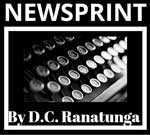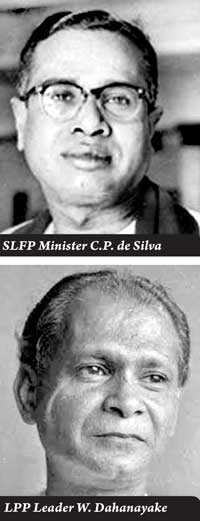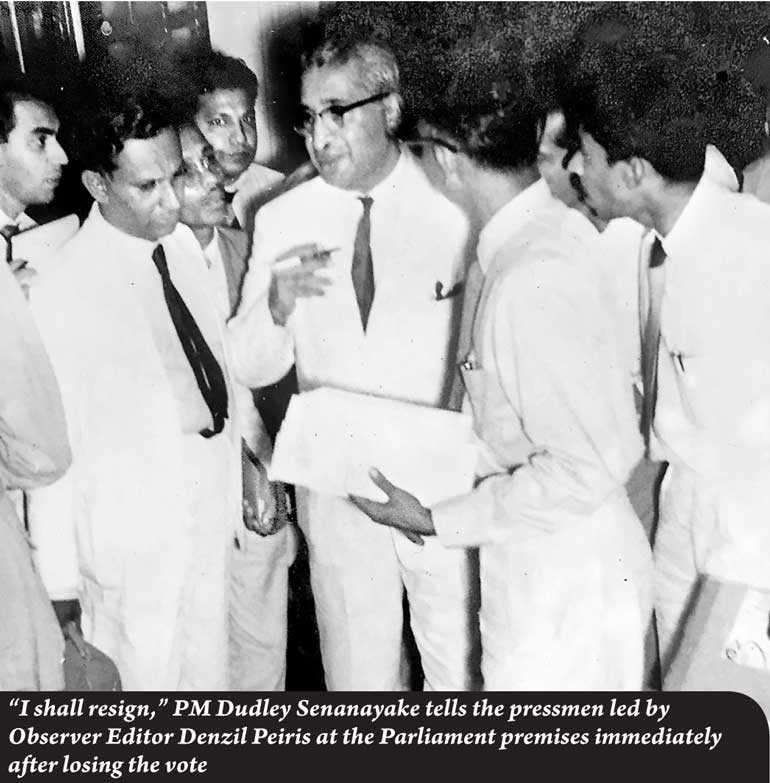Sunday Feb 22, 2026
Sunday Feb 22, 2026
Saturday, 11 May 2019 00:05 - - {{hitsCtrl.values.hits}}
 My first experience in a general election as a journalist was in March 1960 following the sudden decision made by Prime Minister Dahanayake. It turned out to be quite exciting.
My first experience in a general election as a journalist was in March 1960 following the sudden decision made by Prime Minister Dahanayake. It turned out to be quite exciting.
While other reporters were assigned to follow the plans by the leading political parties including covering major election meetings, my task was to be in touch with the Department of Elections. I found the Commissioner of Elections, E.F. Dias Abeysinghe, very friendly and obliging. I found time to watch election meetings too.
It was more interesting in a way, than the earlier elections due to the far-reaching recommendations of the 1959 Delimitation Commission – the second after Independence. The three-member Commission comprised of Walter Thalgodapitiya (Chairman), G.C. Tambiah and M.A.S. Marikkar. Many were the changes in the electoral system due to these recommendations.
In order to restrict malpractices the voters were forbidden to travel in others’ vehicles to election booths except in their own vehicles or by public transport. The display of posters and other publicity materials close to the booths were prohibited. There were several other restrictions.
Postal cards giving details of the voter’s number, polling district and polling booth were sent to the eligible voters well ahead of the Election Day making it convenient for both the voter and the booth officials.
With the increase in the population the number of electorates was increased to 145 electing 151 members as against 89 electorates with 95 members. A major change was that for the first time the election was to be held on a single day.
 The increase in the number of seats meant more candidates contesting. A record number of 899 candidates of whom 167 were Independents, handed over nominations. In addition to Prime Minister Dahanayake’s newly-formed Lanka Prajatanthravadi Pakshaya (LPP), three former parliamentarians and set up new parties. They were I.M.R.A. Iriyagolle (Samajavadi Mahajana Pirivena), K.M.P. Rajaratne (Jathika Vimukthi Peramuna) and S.D. Bandaranayake (Bosat Bandaranaike Peramuna).
The increase in the number of seats meant more candidates contesting. A record number of 899 candidates of whom 167 were Independents, handed over nominations. In addition to Prime Minister Dahanayake’s newly-formed Lanka Prajatanthravadi Pakshaya (LPP), three former parliamentarians and set up new parties. They were I.M.R.A. Iriyagolle (Samajavadi Mahajana Pirivena), K.M.P. Rajaratne (Jathika Vimukthi Peramuna) and S.D. Bandaranayake (Bosat Bandaranaike Peramuna).
The Sri Lanka Freedom Party (SLFP) elected C.P. de Silva to lead the party while Dudley Senanayake came back as leader of the United National Party (UNP) after being out of party activities due to ill health. Philip Gunawardena named his party Mahajana Eksath Peramuna (MEP) since the coalition no longer existed.
The results showed the UNP winning 50 seats with the SLFP a close second with 46. The Federal Party won 25 seats and the MEP 10. The LSSP won only four seats – the same number that Dahanayake’s LPP won. The Communist Party’s tally was three. Candidates from 10 parties failed to win a single seat.
Although he was very popular among the people, surprisingly Dahanayake lost his seat – Galle, to the UNP candidate, W.D.S. Abeygunawardena. This was the first time that a sitting prime minister lost his seat. Only four out of 101 candidates from his party had won.
Then Secretary to the Prime Minister, Bradman Weerakoon in his book ‘Rendering Unto Caesar’ writes how when he went to Temple Trees that evening, Dahanayake was sitting in an armchair in the long verandah “with his two faithful suitcases” by his aside. He made a request – to permit the use of one of the two official Humber Hawks the Prime Minister’s office had, to be used for dropping him at his home in Galle.
“I was sad to see him leave alone that evening, only accompanied by his bags. The staff came together to see him off, gathered around the portico as the car drove off, and gave him a spontaneous cheer of good wishes and farewell.”
The UNP having the most number of seats, Dudley Senanayake was invited to form the government. However, when the Address from the Throne outlining the Government’s programme was presented in Parliament, an amendment proposed by the opposition that the House of Representatives had no confidence in the Government was passed by a majority of 25 votes. Keeping to a promise he made that if the Government lost Parliament would be dissolved, Dudley S advised the Governor-General to do so. Parliament was dissolved and the general election fixed for 20 July.
The fourth Parliament since Independence thus created a record by being the shortest. Two general elections were being held within a short period of four months.
